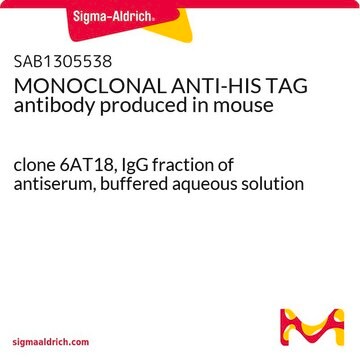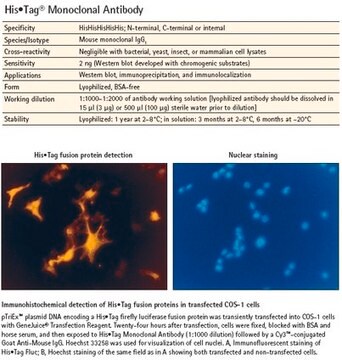SAB2702218
Monoclonal Anti-6X His tag antibody produced in mouse
clone GT359, affinity isolated antibody
Synonym(s):
Mouse Anti-Hexa Histidine tag
About This Item
Recommended Products
biological source
mouse
Quality Level
conjugate
unconjugated
antibody form
affinity isolated antibody
antibody product type
primary antibodies
clone
GT359, monoclonal
form
buffered aqueous solution
species reactivity
human, mouse
concentration
1mg/mL
technique(s)
ELISA: suitable
immunofluorescence: suitable
immunoprecipitation (IP): suitable
western blot: 500-3000
isotype
IgG3
shipped in
wet ice
storage temp.
−20°C
target post-translational modification
unmodified
Related Categories
General description
Immunogen
Application
Monoclonal Anti-6X His tag antibody produced in mouse has been used in Co-Immunoprecipitation (Co-IP) and immunoblotting.
Biochem/physiol Actions
Features and Benefits
Other Notes
Physical form
Disclaimer
Not finding the right product?
Try our Product Selector Tool.
Storage Class Code
10 - Combustible liquids
WGK
WGK 1
Flash Point(F)
Not applicable
Flash Point(C)
Not applicable
Certificates of Analysis (COA)
Search for Certificates of Analysis (COA) by entering the products Lot/Batch Number. Lot and Batch Numbers can be found on a product’s label following the words ‘Lot’ or ‘Batch’.
Already Own This Product?
Find documentation for the products that you have recently purchased in the Document Library.
Customers Also Viewed
Our team of scientists has experience in all areas of research including Life Science, Material Science, Chemical Synthesis, Chromatography, Analytical and many others.
Contact Technical Service














